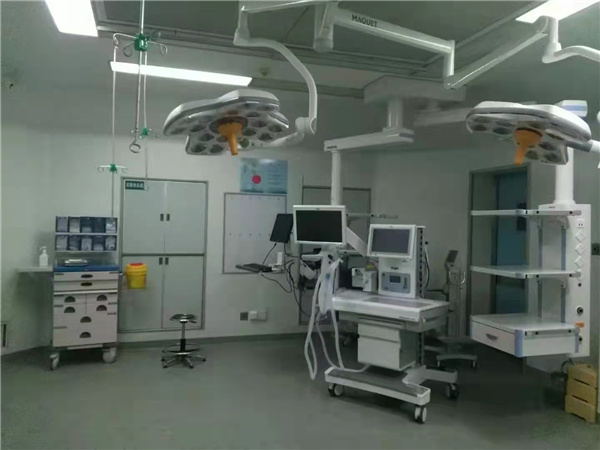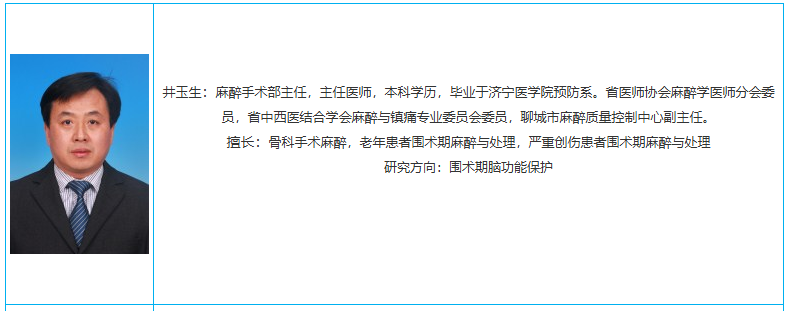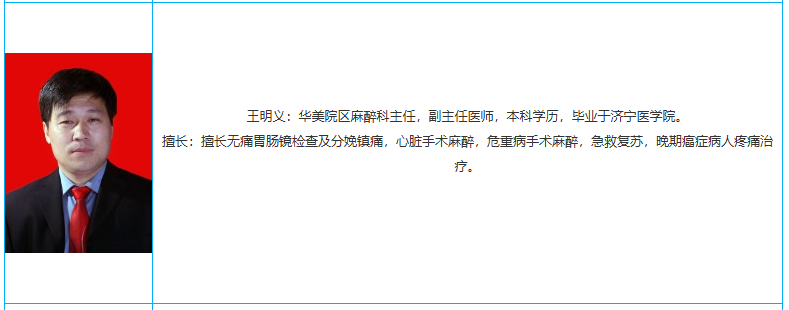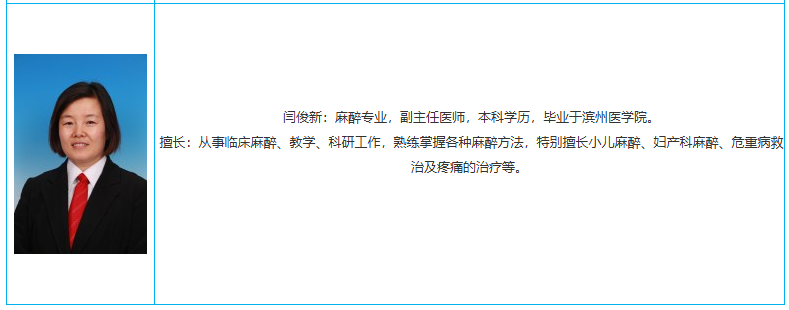- Date:2023-06-23
The Department of Anaesthesia and Surgery was founded in 1982, and after 30 years of development, it has now become a leading clinical department in the province, integrating clinical, teaching, scientific research and training, and consisting of clinical anaesthesia, post-anaesthesia care unit (PACU), pain clinic and other specialties. The hospital is located in the border of Hebei, Shandong and Henan, and the Department of Anaesthesia is responsible for the clinical anaesthesia and emergency treatment of patients with difficult and critical illnesses in the surrounding areas. 1990, the Department of Anaesthesia was the first one to carry out anaesthesia for cardiac surgery with extracorporeal circulation in Liaocheng City, and now it completes more than 200 cases of cardiac surgery every year. 2008, the Department carried out reconstructive surgery for neonatal esophageal atresia and neonatal surgery for the extraction of huge nephroblastoma, as well as temperature monitoring. 2011 Carried out anaesthesia for cranial and cerebral surgeries such as intracranial artery bypass grafting and carotid endarterectomy.2019 Applied bronchial sealing technique to anaesthesia for thoracoscopic surgery, and Flotrac/Vigileo cardiac output technique to monitor critically ill patients, which guaranteed patient safety. Actively developing extra-operating room anaesthesia including painless gastroenteroscopy anaesthesia, painless bronchoscopy anaesthesia, painless abortion anaesthesia and labour analgesia technique, and labour analgesia technique under intrathecal anaesthesia has reached more than 50%.
In May 2009, the anaesthesia recovery room was established, and now 9 recovery beds are set up to undertake pre-anaesthesia preparation and anaesthesia recovery, monitoring and treating postoperative recovery from general anaesthesia and physiological disorders caused by anaesthesia surgery, which guarantees the perioperative safety of the patients.The anaesthesia electronic informatization management was realized in May 2010, which accelerates the departmental informatization construction and improves the anaesthesia work efficiency.
In April 2016, Huamei Hospital District was operated, with 18 operating rooms and 4 resuscitation beds, which greatly relieved the tension of the operating table and provided a brand-new development opportunity for the rapid development of the Department of Anaesthesia and Surgery. There are 30 purified operating theatres, with an average of more than 60 operations per day. Each operating room adopts the international advanced laminar flow air purification facilities and is equipped with imported anaesthesia machines and multifunctional life monitors, which provide a safe and reliable guarantee for clinical anaesthesia. The anaesthesia equipment and facilities are advanced, including blood gas analysis machine, portable ultrasound and visual laryngoscope. Imported multifunctional operating beds, shadowless lamps, imported high-frequency electrosurgical knife and other equipment ensure the smooth progress of surgery.
The talent echelon of the Department of Anaesthesia and Surgery has a reasonable structure, with 37 professional treatment staff, including 2 chief physicians, 4 deputy chief physicians, 13 attending physicians, 18 residents, 62 nursing staff, 22 chief nurses, 33 nurse practitioners and 7 nurses. The department attaches great importance to staffing, and introduces different levels of medical personnel every year. The age level is reasonable, among 37 medical personnel, 4 are above 50 years old, 4 are 40-50 years old, 13 are 30-40 years old, and 16 are 20-30 years old. Academic composition, of which 6 people with postgraduate qualifications, the rest are university undergraduate degree. Undergraduate teaching work of Binzhou Medical College, has been awarded as ‘excellent teaching department’ for many times in a row. The department attaches importance to the exchange and cooperation, a number of doctors have been to Beijing, Shanghai, Zhejiang and other higher hospitals to study and exchange, promoting the development of the discipline and the growth of young doctors.
Clinical anaesthesia work always adheres to the core of medical quality and safety, and has established a safe and efficient clinical anaesthesia management system and process. The department independently carries out the routine clinical technology projects of tertiary hospitals, such as anesthesia for laparoscopic surgery, anesthesia for geriatric patients, anesthesia for pediatric surgery, anesthesia for patients with shock, anesthesia for cardiac surgery, anesthesia for endocrine diseases, anesthesia for patients with acute and critical conditions, and anesthesia for neurosurgical surgery.
1. Construction of anaesthesia subspecialty
According to the development needs and professional characteristics of the discipline, the Headquarter is divided into thoracic and cardiac surgery anesthesia group, abdominal surgery anesthesia group, orthopedic anesthesia group, anesthesia group of the two glands, anesthesia group of anesthesia resuscitation, and pain diagnosis and treatment group, etc., while the Huamei Hospital is divided into cranial and cerebral surgery anesthesia group, gynecology and obstetrics anesthesia group, anesthesia resuscitation anesthesia group, pain diagnosis and treatment group, etc., and the norms and paths of anesthesia and pain diagnosis and treatment for the corresponding specialties are established. We have established norms and pathways for anaesthesia and pain management in the corresponding specialties. The team leaders are responsible for the implementation of the system, with the deputy chief physician or senior attending physician with technical expertise as the team leader, and the attending physicians and residents are equipped with the corresponding professional ability to carry out clinical anaesthesia work.
2、Speciality Technology and Research Direction
Comfortable medical technology
From the very beginning of painless abortion, the scope of business has been gradually expanded, and painless gastroenteroscopy, painless ERCP, painless childbirth and painless bronchoscopy have been carried out, and the rate of analgesia in childbirth has reached more than 50%.
Visualisation Technology
The promotion and application of clinical anaesthesia visualization technology is of positive significance in improving the clinical technology level of anaesthesiology department, reducing anaesthesia complications, and improving the satisfaction of patients and the society. It mainly includes: ultrasound-guided nerve block technique, ultrasound-guided arterial and venous puncture technique, difficult airway and anaesthesia visualization technique, application of video laryngoscope in thoracic anaesthesia and so on.
Bronchial blockade technique
It can satisfy one-lung ventilation in open-heart surgery, can provide good lung atrophy, can selectively seal the whole lung and lobes, can improve intraoperative hypoxaemia (selective lobe sealing), is simple to operate, has a high success rate, is less damaging, and is easy to be adjusted after displacement. Carrying out bronchial sealing technology, combined with fibreoptic positioning, the successful satisfaction rate of one-lung ventilation has been greatly improved, which meets the needs of thoracic surgical operations.
Postoperative analgesic technology
The department has formulated the postoperative acute pain management system and process, implemented the acute pain management team (APS) management mode, and has a professional anaesthesiologist analgesic nurse in charge. In the analgesic work, according to different patients, different surgical methods and different anaesthesia methods to choose reasonable analgesia, the implementation of multi-modal analgesia. the implementation of the APS analgesic management mode, reduce analgesia-related complications, analgesic effect and patient satisfaction significantly improved.








 鲁ICP备11009722号-4
鲁ICP备11009722号-4 